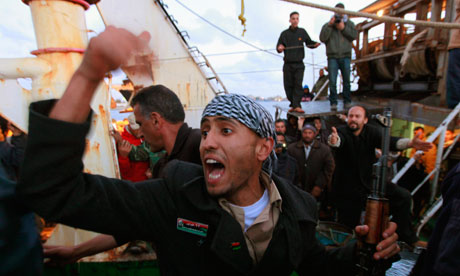The Libyan mission is creeping, no doubt
Libyan civilians are evacuated by a fishing boat from Misrata to Benghazi. Photograph: Yannis Behrakis/Reuters
Mission creep is an unpleasant condition brought on by a surfeit of military ambition and lack of self-knowledge.
Symptoms include fantasy-like delusions such as the highly contagious belief, known as Sarkozy-itis, that the sufferer alone knows what’s best for the world. This is typically followed by cold sweats and hot flushes when political reality proves otherwise. Mission creep is not treatable and hindsight is the only cure. It usually ends in disaster.
Such was the case in Vietnam, where President John F Kennedy’s decision to increase the number of US “military advisers” to the south Vietnamese regime opened the path to all-out war. Mission creep struck again after the US intervened in Somalia in the early 1990s, producing another debacle. In fact the term was coined at that time by the distinguished Washington Post columnist, Jim Hoagland. Afghanistan since 2001 has been not so much creep as rapid crawl into a military never-never land.
Britain’s announcement that it is sending a “military liaison advisory team” of experienced officers to Benghazi to assist the rebels’ national transitional council looks like another outbreak of the disease. Foreign secretary William Hague was adamant the British army was not taking charge of the campaign against Muammar Gaddafi. The “advisers” would not be arming, training or directing the rebel forces, he said. To which the world-weary response must be: just give them time.
Britain is now publicly doing what it expressly said it would not do when the no-fly intervention began: putting boots on the ground in Libya. France is taking similar action. Given that the rebel forces have convincingly demonstrated their inability to win on their own, given the sizeable negatives for David Cameron and Nicolas Sarkozy of an open-ended, inconclusive conflict, and given Barack Obama’s flat refusal to do any more, the question now is: how many more British and French boots will follow, sooner or later, in the advisers’ fateful footsteps?
It’s plain where the pressure for closer, more direct Anglo-French involvement is coming from. Most of Nato, despite numerous joint statements, is sitting this one out. Of its 28 members, 14 are said to be “actively participating” but only six are doing any fighting. Of the 22-country Arab League, whose panicky appeal prompted the UN to authorise the intervention, only Qatar and the UAE have shown up for duty. Excluding them, of the 192 members of the UN general assembly, who all have a legal “responsibility to protect” civilians attacked by their own governments, only Sweden has put its money where its mouth is.
By demanding (with Obama) that Gaddafi and his family relinquish power – and, indeed, by making this so far unlikely outcome the definition of their success – Cameron and Sarkozy have added to the pressures upon them. By suggesting that Benghazi, facing destruction last month by Gaddafi’s forces, would have been a new Srebrenica but for the intervention, the allies must now, logically, offer the same level of protection to Misrata and other desperate towns. This may only be achieved by ground-based intervention.
By encouraging and assisting rebel resistance, as George Bush Snr did with the Shias of southern Iraq in 1991, Britain and France risk worsening the plight of the Libyan civilians they are primarily pledged to defend. The UN and concerned aid agencies all agree the humanitarian situation is growing steadily worse, the longer the conflict continues. These considerations have led former British foreign secretary David Owen, among others, to urge the creation of Bosnian or Kurdish-style “safe havens”, starting with an exclusion zone around Misrata defended by British and French troops.
But how long before allied troops so deployed were themselves drawn into direct engagements with pro-Gaddafi forces, be they regular army, mercenary or civilian? Pernicious mission creep tends to blind affected decision-makers to such obvious concerns. “Just as Benghazi was saved within hours, so must Misrata be. We have probably only a few days …” Owen wrote in the Times. In other words, don’t think about it. Just do it.
Owen’s proposal has no official standing, not yet at least. But escalation is in the air – and on the ground. The EU is discussing what it says is an approved “concept of operations” for sending European troops to Libya to protect refugees and humanitarian relief efforts. Nato strike aircraft, unsuited to killing alleyway snipers, are instead widening their target range to include Gaddafi’s communication lines and his home town of Sirte. And off the record, nobody bothers to deny that British and other special forces are already operating in theatre. Today’s announcement about military advisers is a public acknowledgement of hitherto covert ground-level involvement.
It’s worth recalling that UN security council resolution 1973, passed last month, does not authorise member states to support the rebels, to defend armed groups, or to oust Gaddafi. Nor does it authorise an Iraq-style ground invasion or military occupation, in any shape or form, size or scale. But in reality, much of this is now happening, willy-nilly. Make no mistake: the creep is on.
hasEML = false;


